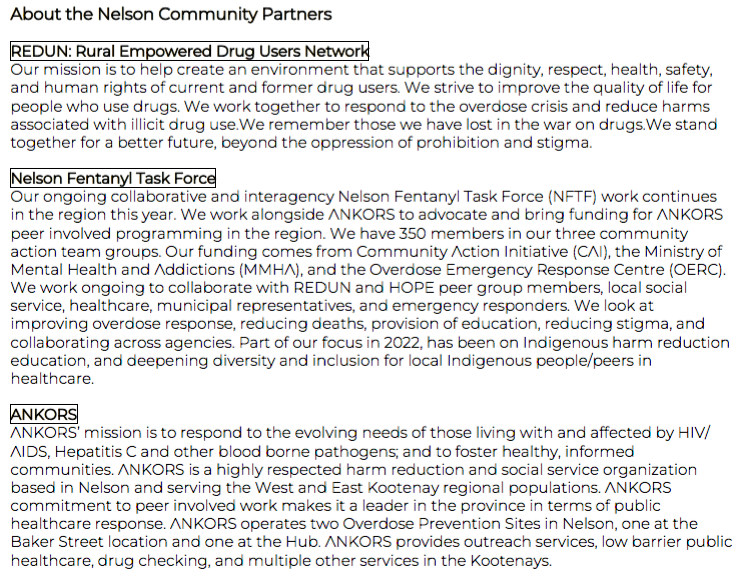Decriminalization pilot project panned on how it affects rural communities: report
The Province’s decriminalization pilot project is not satisfactory given the low threshold of 2.5 grams of substance for personal use, claims a report recently released soliciting comments from community members actively involved in responding to the rural drug poisoning crisis.
Entitled Bridging Community Connections: Human Rights, Public Space and Harm Reduction in our Rural Region, the 12-page report arose out of two-day dialogue in Nelson from Oct. 17-19, 2022, and panned the Province’s bid to respond to the drug poisoning crisis in rural British Columbia
“Many participants at the dialogue stated that the new federal exemption for up to 2.5 grams of a substance, known as decriminalization in B.C., is disappointing,” the report pointed out.
Although the incremental drug policy — slated to last until Jan. 31, 2026 — was felt by the report respondents to be a good start, it did not address the illicit toxic drug supply.
“This means people will continue to be at a high risk of overdose and overdose-related death,” the report noted.
One year ago
Approximately 60 community members actively involved in responding to the rural drug poisoning crisis gathered for two days of dialogue in Nelson on Oct. 17-19, 2022.
Participants came from Nelson, Castlegar, Trail, Grand Forks and Cranbrook to represent the local response to the drug poisoning crisis in rural British Columbia.
They were supported to gather by the Canadian Drug Policy Coalition (CDPC) — an organization that advocates for human rights and social change in drug policy in Canada — for “Getting to Tomorrow: Ending the Overdose Crisis,” a series of Canada-wide community discussion events.
The discussions centred around the impacts of criminalization, safe supply, harm reduction in rural contexts, decriminalization, legal regulation and community wellness.
Source: Getting to Tomorrow
The threshold amount of possession of a controlled substance proposed by a B.C. working group — that included people who use drugs — was much higher than 2.5 grams of substances.
“There were concerns among conference participants that the low threshold might actually lead to more people being criminalized,” the report read. “Specifically, in rural communities, the low threshold of 2.5 grams will not work well for people who live and work in remote areas.
“These populations will experience significant challenges because they typically purchase larger quantities due to geographic distance, lack of transportation, and accessibility.”
Instead, it was recommended personal use threshold amounts should be increased for up to a one-week supply, especially for people living in rural communities.

The long arm
Decriminalization may not interrupt oppressive relationships between police and people who use drugs, the report noted.
Historically, police tend to target and cast judgment on certain groups of people, particularly vulnerable and marginalized groups of people, like drug users, the report claimed.
“Some participants believed that police will increase the number of searches and lay alternative charges, resulting in the continued criminalization of people who use drugs,” it said.
“This concern may stem from the fact that law enforcement’s voices were centered at policy and decision-making tables when setting the new federal exemption policy in 2022. Despite reaching consensus in the B.C. working group that a threshold of 4.5 grams would be appropriate, the federal government opted for a threshold of 2.5 grams due to the requests of law enforcement.”
People who use drugs are the experts on their needs and should have been more meaningfully engaged in the process of developing the decriminalization pilot project, the report found.






















